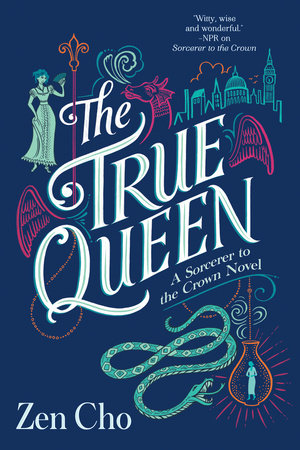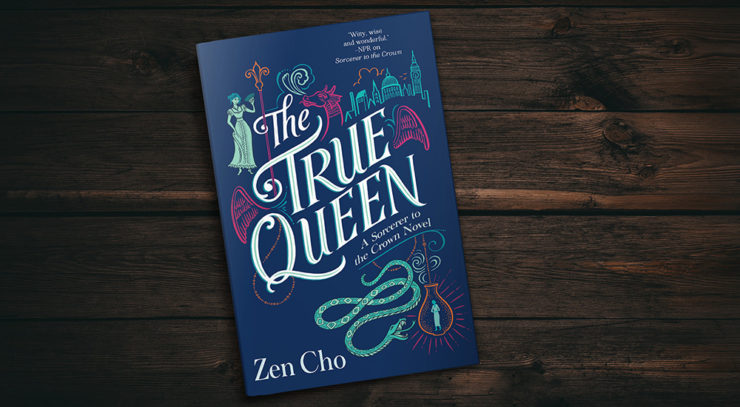After three-and-a-half long years, Zen Cho’s the Sorcerer Royal series is back! I cannot adequately explain how much I’ve missed Prunella and Zacharias and their magical Regency world, nor how excited I am to have them in my life once more. Given how lovely The Sorcerer to the Crown was, I went into The True Queen a bit trepidatious that it wouldn’t live up to its predecessor. But this is Zen Cho we’re talking about so of course my worries were unfounded.
After a terrible storm off the coast of the island of Janda Baik, two sisters, Muna and Sakti, wake up lost and alone on the beach. Mak Genggang, a powerful local witch who protects the island, takes the young women in. Sakti is impulsive and self-centered while Muna contemplative and considerate, but the biggest difference between them is that Sakti has magic and Muna doesn’t. Unable to resolve the curse that took the sisters’ memories and hoping to avoid turning an attempted burglary into an international incident, Mak Genggang sends them to England to meet with the new Sorceress Royal.
Prunella Wythe hasn’t had an easy go of being the Sorceress Royal. With the help of Henrietta Stapleton and her husband Zacharias, she’s opened a magic school for girls. But England’s male thaumaturges refuse to accept her or her charges and are just as bigoted and crass as ever. After Sakti goes missing in the realm of the fairies, Muna turns up at Prunella’s door feeling hopeless. Things get even more complicated with the Fairy Queen’s emissary barges in on a ball and threatens to kill everyone unless Prunella hands over the Queen’s missing Virtu. Deception abounds from all corners, sometimes out of desperation to help a loved one and sometimes out of greed and pride. Yet no matter how dangerous or fearsome it gets, love always wins out.
Like with Sorcerer to the Crown, The True Queen tackles misogyny, colonialism, racism, and classism head on. Again and again, Muna is subjected to exoticism and sexism, being simultaneously fetishized for being an Indigenous woman with a (perceived) talent for magic and shamed for it. The English are happy to trot her out as a parlor trick at a ball, and just as quick to hurl invectives and insults at her for refusing to accept their arbitrary social hierarchy rules. Prunella suffered through it in the first book, but it’s even more intense now that she’s the Sorceress Royal. Except she’s also shielded in a way that Muna is not. Prunella has power (social, political, and magical), wealth, and a husband while Muna has little to gain from entertaining the hostilities of the English male thaumaturges but plenty to lose. She has no political capital or an English gentleman eager to marry her to give her the veneer of legitimacy. Compared to Prunella, Muna is at a severe disadvantage.
It’s not often fantasy fiction gives readers that kind of nuance with people of color, where the author demonstrates the harsh reality of the different levels of privilege afforded to people from similar spheres. These women aren’t the same—Prunella is half Indian and half white while Muna is from an island in the Malacca Strait called Janda Baik, but in the real world it’s a village in Malaysia—but to the English they might as well be. So to see Cho toy with those expectations, racist and innocent alike, is powerful stuff.
Cho also explores identity and personal truth. Who you are, who you’re supposed to become, and who you truly want to be are questions that come up repeatedly with all the characters, but especially Muna and Henrietta. While I can’t discuss the particulars of their truths without spoiling the novel, suffice it to say, both are in denial about themselves. It’s easier to not know who you are, to float along in the world doing what you’re told, to accept that things cannot be changed. Confronting yourself and letting others see the true you are terrifying acts that not all of us are brave enough to take. Henrietta knows mostly who she is but cannot let the world see her, but Muna blindfolds herself to her own truth and lets the world make its own assumptions about her. They may find bits of happiness, but neither will ever know peace.
Buy the Book


The True Queen
Yet every time they do manage to carve out a little personal space, someone else backs them in a corner of self-sacrifice. To solve her father’s debts and secure her sisters’ marital eligibility, Henrietta must marry a man she doesn’t love and who doesn’t respect her magical ability. To rescue her sister, Muna must lie to her only allies and risk her life in the Fairy Queen’s court. Yet there is no hesitation. They do what they feel they must because they think it’s best even when they know it’s not right.
Women sacrificing themselves for the greater good is old territory in fiction, but yet again Cho pushes past the tropes to something unexpected. She calls them out on their self-sacrificial behavior. Muna and Henrietta’s actions seem like good ideas on paper, but in practice they’re deeply flawed. Sacrifice means being beholden to a corrupt system; resistance requires dismantling the system entirely. By surrendering their lives, Muna and Henrietta remain trapped in a system that doesn’t care about them, but by fighting back they can break the system and create something new from the wreckage. They learn that lesson the hard way.
Written with wit, charm, and heart, this is the perfect follow-up to a perfect debut novel. Although this go-round feels a little less like Jane Austen and a little more like Susanna Clarke, it’s still beautiful in every way. Filled with exciting adventures, death-defying feats, unshakable bonds, and simmering romance, The True Queen delights from every angle. The wait for this novel was long, but oh so worth it.
The True Queen is available from Ace Books.
Alex Brown is a high school librarian by day, local historian by night, author and writer by passion, and an ace/aro Black woman all the time. Keep up with her on Twitter and Insta, or follow along with her reading adventures on her blog.










